Epoxy coating has become a popular option for flooring. Whether you are considering an epoxy floor coating applications for your kitchen floors or applying epoxy coatings on your garage or shop floor, the design elements of this type of flooring are a thing of beauty. We wrote this article to help home owners understand our process; to provide you with a complete guide and understanding of residential epoxy flooring.
Is Epoxy Flooring Good for Homes?
Yes, using an epoxy coating application in your home is a great option. This type of surface is easy to maintain and keep clean as it protects the material underneath from moisture, stains, and cracks. It is also safe since it is slip-resistant and is a durable floor. Epoxy can be used on wood, metal, cement, or concrete. The advantages and benefits of epoxy flooring have caused homeowners to consider other places within their houses for this flooring option.
How much does it cost for residential epoxy floors?
The price range of epoxy flooring systems is between $5.00 to $8.00 per square foot, with installation. The majority of the expense is in the labor. There are different variables to consider, such as the size of the project and the quality of epoxy used for the project that contributes to the overall cost. Some projects can be expensive, but there are ways of making them a more affordable option.

Do the prep work of the floor space yourself. The floor must be thoroughly cleaned beforehand because the floor must be free of all grease, dirt, and any other residues. There can be considerable savings in doing this part yourself.
The type of epoxy applied directly impacts the price of the project. There are three options available for residential epoxy flooring: solid epoxy, solvent-based epoxy, and water-based epoxy.
What is the difference?
- Solid epoxy: is the most expensive option. This material is in its purest form; it is just resin with hardener added without including any added water or solvents. Solid epoxy creates a thick coating that is a durable material and is an excellent choice in commercial spaces with heavy foot traffic. It requires quick application because it has a short pot life and needs to be applied within a certain timeframe, usually 30 to 40 minutes before it begins to harden. Solid epoxy can cost as much as $150 a gallon.
- Solvent-based epoxy: is more of a mid-range price option. A solvent or water serves as a carrier agent when added. The curing process begins immediately after mixing resin and the hardener. This type of epoxy coating increases the window of time available for application. Solvent-based epoxy also produces a strong and durable surface with a glossy finish with slight strength reduction in comparison to solid epoxy. However, the pricing of solvent-based epoxy is usually less expensive, starting at $50 a gallon.
- Water-based epoxy: is the most affordable choice with an inexpensive price of $30 a gallon. As mentioned with solvent, water acts as a carrier agent allowing for a longer pot life. Water-based epoxy usually contains no added solvents and that means no fumes or smells. Its consistency is much thinner and is a much easier application. Since it does not produce a thick finish as the others, it is not recommended for industrial projects.
How Long do Epoxy Floors Last?
The lifespan of epoxy floors is based on care provided. Obviously, solid epoxy provides a more durable and thicker finish than water-based, but both types can last for years with proper maintenance. A professionally installed epoxy flooring system can last anywhere from 20 to 30 years.

How do you maintain an epoxy floor?
Easy maintenance does not mean maintenance-free and certain steps can aid in maintaining your flooring in top condition.
- Regular removal of dust and dirt is necessary. As these things collect and remain on your floor, you will begin to notice scratches on your once shiny finish.
- Be careful what cleaner is used on your flooring. It is imperative to not use cleaners with acidic compounds because they can ruin the floor finish. Soap is often avoided because it leaves a haze afterward and builds up after each cleaning creating a dull finish eventually.
- If you spill something accidentally, take the time to spot clean the area right away. Do not wait until a later cleaning time to prevent potential issues.
- Remove stains with a little scrubbing. If there is a stain that is stubborn resist the urge to grab something abrasive to scrub it with. A soft kitchen sponge and water, along with a little elbow grease will do the trick. Try to stay focused on the stain without much contact with the surrounding area.
Are there any disadvantages of Epoxy Flooring?
There are disadvantages to all types of flooring and the same is true of epoxy flooring. The biggest disadvantage is that it will eventually need replacing. It is exceptionally durable but everyday footprints may begin to show. Again, this is true with any type of flooring with proper care and maintenance will prolong its lifespan and cleanliness.
There is also the disadvantage of fumes during application (depending on the type of epoxy used), but this is temporary, and any smell is gone after curing is complete. Water-based epoxy does not produce fumes and smells as previously discussed.
Thinking about a unique epoxy floor in your home?
Epoxy flooring continues to grow in popularity and not just for commercial applications but including your next home project.
Regardless of the size or area of the project, you want a trusted expert for the job. Canadian Concrete Surfaces provides over 25 years of experience producing the PERFECT FLOOR. Get in touch today for a free flooring estimate and to explore the amazing possibilities or residential epoxy flooring!

Devon has over 25 years of experience providing customers with high performance epoxy flooring to fit any need or budget. Referrals are our best friend and customer satisfaction is always our top priority. When Devon is not working you can find him fishing, or hunting across North America.
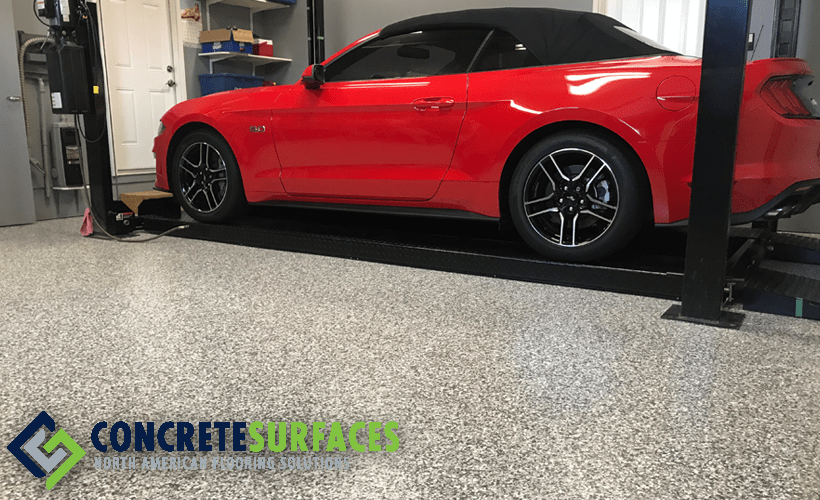

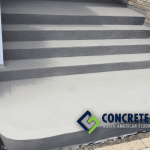
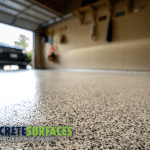
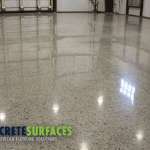
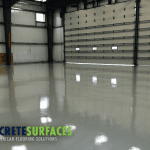

Share This Article
Choose Your Platform: Facebook Twitter Google Plus Linkedin